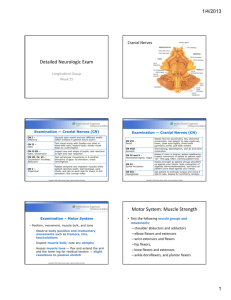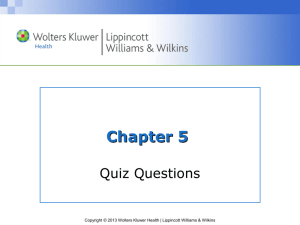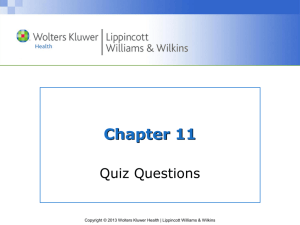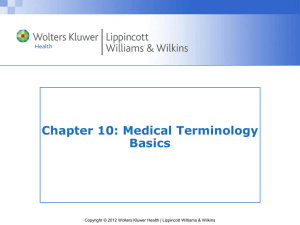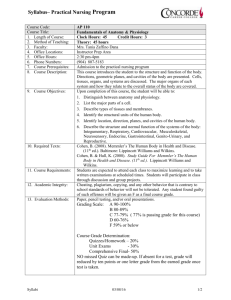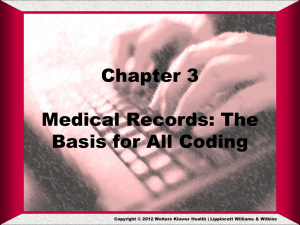Chapter 9
advertisement
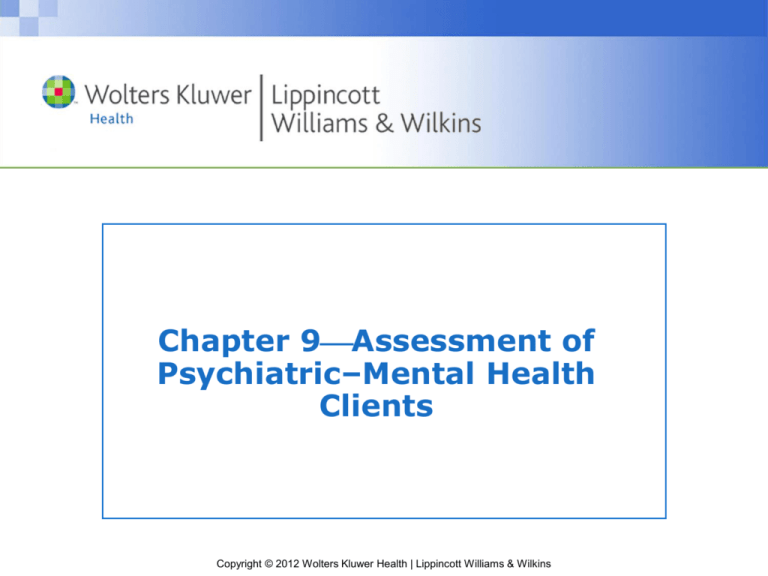
Chapter 9Assessment of Psychiatric–Mental Health Clients Copyright © 2012 Wolters Kluwer Health | Lippincott Williams & Wilkins The first step in the nursing process, the assessment of the client, is crucial. Assess the client in a holistic way, integrating any relevant information about the client’s life, behavior, and feelings. Remember that the focus of care, beginning with the initial assessment, is toward the client’s optimum level of health and independence from the hospital. Schultz and Videbeck, 2009 Copyright © 2012 Wolters Kluwer Health | Lippincott Williams & Wilkins Learning Objectives After studying this chapter, you should be able to • Discuss the nursing process • Articulate the purpose of a comprehensive nursing assessment • Differentiate the purpose of a focused and a screening assessment • Understand the significance of cultural competence during the assessment process Copyright © 2012 Wolters Kluwer Health | Lippincott Williams & Wilkins Learning Objectives (cont.) • Recognize how disturbances in communication exhibited by a client can impair the assessment process • Describe the importance of differentiating among the six types of delusions during the assessment process • Distinguish the five types of hallucinations identified in psychiatric disorders Copyright © 2012 Wolters Kluwer Health | Lippincott Williams & Wilkins Learning Objectives (cont.) • Illustrate the differences between obsessions and compulsions • Discriminate levels of orientation and consciousness during the assessment process • Reflect on how information obtained during the assessment process is transmitted to members of the health care team • Formulate the criteria for documentation of assessment data Copyright © 2012 Wolters Kluwer Health | Lippincott Williams & Wilkins Six Steps of the Nursing Process Assessment Nursing diagnosis Outcome identification Planning (formulation of a plan of nursing care) Implementation of nursing actions or interventions Evaluation of the client’s response to interventions Copyright © 2012 Wolters Kluwer Health | Lippincott Williams & Wilkins The assessment phase of the nursing process includes nurse–client interaction during the collection of data about a person, family, or group by the methods of observing, examining, and interviewing. Copyright © 2012 Wolters Kluwer Health | Lippincott Williams & Wilkins Client Assessment Types of Data Types of Assessment • Objective data • Subjective data • Comprehensive assessments • Focused assessments • Screening assessments Copyright © 2012 Wolters Kluwer Health | Lippincott Williams & Wilkins Cultural Competence During Assessment (Mackey-Padilla, 2005; Kanigel, 1999) Assess and clarify the client’s cultural values, beliefs, and norms. Assess the client’s degree of cultural assimilation/acculturation. Assess the client’s perspective regarding feelings and symptoms. Elicit the client’s expectations and ask what is important for the health care provider to know. Learn how to work with interpreters. When using an interpreter, talk to the client rather than the interpreter. Seek collaboration with bilingual community resources. Copyright © 2012 Wolters Kluwer Health | Lippincott Williams & Wilkins Collection of Data • Appearance • Memory • Affect or emotional state • Intellectual ability • Behavior, attitude, and coping patterns • Insight regarding illness • Communication and social skills • Content of thought • Spirituality • Sexuality • Neurovegetative changes • Orientation Copyright © 2012 Wolters Kluwer Health | Lippincott Williams & Wilkins Impaired Communication • Blocking • Mutism • Circumstantiality • Neologism • Clang association • Perseveration • Echolalia • Tangentiality • Flight of ideas • Verbigeration • Looseness of association • Word salad Copyright © 2012 Wolters Kluwer Health | Lippincott Williams & Wilkins Content of Thought • Delusions • Hallucinations • Depersonalization • Obsessions • Compulsions Copyright © 2012 Wolters Kluwer Health | Lippincott Williams & Wilkins Sleep Pattern Asking clients about their sleep patterns and any problems is an often neglected, but extremely important, area to investigate. • Insomnia • Acute or primary insomnia • Secondary insomnia Copyright © 2012 Wolters Kluwer Health | Lippincott Williams & Wilkins Medical Issues • Pain • Physiological responses to medication Copyright © 2012 Wolters Kluwer Health | Lippincott Williams & Wilkins Supporters or Caregivers Assessment • Informal supporters or caregivers are prone to depression, anxiety, grief, fatigue, changes in social relationships, or other issues. • Strain related to care provision may affect employment, financial, physical, social, and time domains. Copyright © 2012 Wolters Kluwer Health | Lippincott Williams & Wilkins Documentation of Assessment Data • Objective • Dated • Descriptive • Logical • Complete • Signed • Legible Copyright © 2012 Wolters Kluwer Health | Lippincott Williams & Wilkins Key Terms • Acute insomnia • Delusions • Affect • Depersonalization • Blocking • Echolalia • Circumstantiality • Flight of ideas • Clang association • Hallucinations • Compulsions • Illusion Copyright © 2012 Wolters Kluwer Health | Lippincott Williams & Wilkins Key Terms • Insight • Nursing process • Insomnia • Obsessions • Looseness of association • Perseveration • Memory • Secondary insomnia • Mutism • Tangentiality • Neologism • Verbigeration • Neurovegetative changes • Word salad Copyright © 2012 Wolters Kluwer Health | Lippincott Williams & Wilkins Reflection Complete an assessment of a client in your clinical practice setting. • What information did you obtain? • How was that information crucial to the client’s care? Copyright © 2012 Wolters Kluwer Health | Lippincott Williams & Wilkins ?
